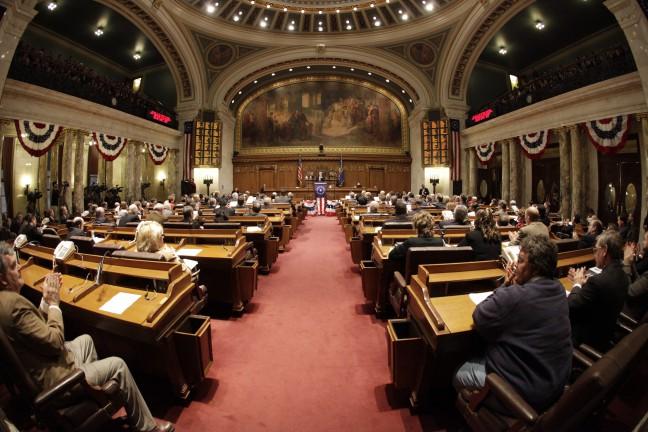The Wisconsin State Legislature will center its focus on COVID-19 aid and redistricting policies as it pushes through another session of divided government.
The legislature convened for its 2021 session Jan. 4 and is scheduled to adjourn Dec. 31. Results of the 2020 election left Republicans with a 21-11 majority in the Senate and a 61-36 majority in the House, according to the political database Ballotpedia.
Rep. Dianne Hesselbein, D-Middleton, described the dynamic in the legislature as stagnant at times, and otherwise combative between the Republican majority in both chambers of the legislature and the Democratic governor.
Group of bills circulating in Capitol propose new election regulations
“It’s an interesting dynamic because the Republicans are in the majority but Governor Evers is a Democrat. So every bill that passes, Governor Evers has to sign or veto,” Hesselbein said. “We try to work together but it is hard to work with someone who doesn’t want to talk to you.”
Rep. David Murphy, R-Greenville, emphasized a focus on COVID-19 recuperation and unemployment relief as policymakers work through the 2021 session.
Murphy is optimistic about the unemployment relief, yet expressed disappointment with some of the chosen legislative expenditures.
“The biggest thing we are working on is just trying to bring the state back from the COVID-19 crisis,” Murphy said. “One of the things that has been very difficult is handling the unemployment situation, but I am pleased to say that we passed a bill today that will be somewhat helpful with that.”
Rep. Gordon Hintz, D-Oshkosh, spoke to the importance of long-term policies in education, Medicaid and mental health, particularly during the upcoming years of pandemic recovery.
Hintz additionally highlighted the lack of high-speed broadband internet across the state. The shift to remote education and work illustrated a lack of universal internet coverage for all citizens.
Sen. Janet Bewley, D-Mason, reinforced Hintz’s advocacy for broadband internet across Wisconsin. Bewley said her district faces everyday challenges, but they are far more extreme because of the geographic isolation of her constituents.
Bewley represents the largest and most rural district in the state and noticed the effects of lack of network especially prevalent during the virtual era of COVID-19.
“It is a very serious problem. I know in urban areas there are places where people can’t access broadband, but the hardware and connectivity are there,” Bewley said. “But in the rural area, it is a problem because the infrastructure for broadband is just not there.”
Following the 2020 census, redistricting will become a major policy topic within the Wisconsin legislature. The state’s government is presently awaiting delayed census data, which are forecasted to arrive by September, Hintz said.
Wisconsin is one of 37 states in the country that holds the legislature responsible for the redistricting process. After processing census results, legislators will work to redraw congressional and state legislative boundaries by the March 2022 deadline, according to Ballotpedia.
Wisconsin congressional delegates vote on key issues, exposing deep political divisions
The Wisconsin government additionally requires that the governor approves the maps drawn by the legislature. During the redistricting processes of the prior decades, the state’s legislature struggled to agree on district maps or the governor vetoed them entirely, according to The Badger Project.
“In 2011, the Republicans controlled everything and they drew maps behind closed doors that were struck down by the courts, eventually going to the U.S. Supreme Court and recognized as the most gerrymandered maps in the country,” Hintz said.
The U.S. District Court for the Western District of Wisconsin found the district map for the Wisconsin State Assembly displayed an illegal partisan gerrymander utilized to “burden the representational rights of Democratic voters … by impeding their ability to translate their votes to democratic seats,” according to Ballotpedia.
Jan. 27, 2020, Gov. Tony Evers signed an executive order to create an advisory, non-partisan redistricting commission coined “The People’s Maps Commission.” The goal of the commission is to prepare congressional and state legislative district plans for consideration by the state legislature, according to The Badger Project.
Many Republicans in the Wisconsin legislature stated this commission and any effort to shift the responsibility of redistricting away from the state’s Congress is unconstitutional. Legislators argue these acts break the constitutionally vested role for the state legislature to adopt a redistricting plan, according to The Badger Project.
Biden pushes $1.9T COVID-19 relief package during visit to Wisconsin
“All I know is that the constitution says the legislature shall redraw maps every year and I’m assuming that the constitution hasn’t been changed, so the legislature will do exactly that,” Murphy said. “I think that the constitution is clear and anything that is different from that would be unconstitutional, in my opinion.”
Hintz argued the public’s perception of the redistricting process favors more accountability for the election system and non-partisan redistricting.
Hintz highlighted the public is active in the redistricting conversation. Many towns passed resolutions and held referendums advocating for accurate representation in the state legislature.
“Legislators need to recognize that how we elect people matters and that we recognize the people should be in charge of choosing who their representatives are,” Hintz said. “The representatives shouldn’t be in charge of choosing their voters.”



















